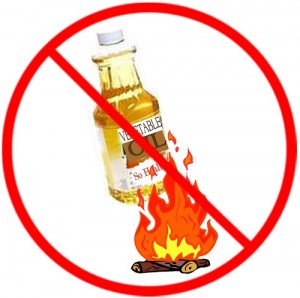In this post on What’s So Bad About Polyunsaturates, I gave a rundown of why PUFAs are dangerous. They increase inflammation, for one! Plus, they can’t take the heat- it leads to rancidity, which leads to free radicals and other adversities.
 If you’re looking to decrease your intake of PUFAs, here’s a little rundown of the PUFA content of a few common oils and fats (see a full list here):
If you’re looking to decrease your intake of PUFAs, here’s a little rundown of the PUFA content of a few common oils and fats (see a full list here):
- Grapeseed oil- 71% PUFA
- Safflower oil- 75% PUFA
- Sunflower oil- 65% PUFA
- Corn oil- 59% PUFA
- Soybean oil- 58% PUFA
- Walnut oil- 55-63% PUFA
- Cottonseed oil- 50% PUFA
- Sesame oil – 41-45% PUFA
- Canola oil- 30-37% PUFA
- Peanut oil- 29-32% PUFA
- Almond oil- 17% PUFA
- Duck fat- 13% PUFA
- Lard- 12% PUFA
- Avocado oil- 10% PUFA
- Goose fat- 10% PUFA
- Palm oil- 8% PUFA
- Olive oil- 8% PUFA
- Butter- 4% PUFA
- Cocoa Butter- 3% PUFA
- Coconut oil- 2-3% PUFA
- Palm kernel oil- 2% PUFA
What does this mean? For one, cook with oils that have 10% PUFA or less. Anything that’s high in polyunsaturated fatty acids is prone to oxidize and deteriorate under heat. Ironically, the more saturated fats (coconut oil, palm oil, lard, tallow, poultry fat) hold up very well under fire. You can cook with them without creating toxic byproducts. A far cry than what they were saying in the 70’s…
Canola oil has been touted as being healthy, but it contains alpha-linolenic acid, which should never be heated. When cooking, note that the extraction processes can affect the quality of the oil. Organic, cold-pressed virgin oil is best.
Friends ask me questions. There are concerns. What?! Canola isn’t the best oil?! What oil’s safe to cook with?! For stove-top cooking, you can always use coconut oil or butter (or leftover fats from cooking a free-range chicken or grass-fed beef). For baking, or lower cooking temperatures, you can use almond, macadamia, virgin palm or olive oils. But you could also consider using some as “finishing oils”. This means you cook, sear, saute, grill (whatever) your foods, perhaps in a minimal amount of your preferred oil as needed, then before serving, drizzle a little virgin olive oil on top (or sesame oil, etc.). The flavors can be more pronounced this way, and it’s healthier too.
Some folks say, “but we don’t like the taste of coconut oil”. You might do what I do sometimes- I get an iron pan quite hot, adding the food I want to sear or brown. A good metal pan, once hot, is more “sealed”; in the process of heating, the molecules of the metal move around faster, closing up more “space” than a colder pan. With a cold pan, the metal molecules are moving slow, with more space between, and they kind of “grab”, making meat and veggies stick more. Weird, right? I saw a video of it once… very interesting!
In any case, if the pan’s hot, you can add your food to it, which will cool the pan down a bit. Then you can add olive oil, butter, coconut oil, or other favorites, and you won’t be subjecting it to as much heat. Olive oil can take some heat, and it is much healthier oil choice that other common “polyunsaturated” vegetable oils.
“Smoke point” is a “hot” issue here. Almond oil, hazelnut, macadamia, olive oil, palm oil, peanut, rice bran, sesame oil, and other monounsaturates or saturated fats can typically take the heat, with smoke points above 400 degrees: Avocado oil can withstand even up to 520 degrees- whew! Butter and coconut oil can’t quite take temperatures above 400 without burning/smoking, although if butter is rendered to remove the milk solids (making “ghee”), it can move to a smoke point of 475. Bring on the clarified butter!
Oh, and posted here is a breakdown of the PUFA content of some of my favorite whole foods: Seeds and nuts!

Very interesting! Did now know that. Will share!
Please do, SF! It’s amazing how we can get so easily programmed by the food companies promoting their products. “Healthy” indeed- HA!
What about extra-virgin olive oil?
What about cooking spray?
I would prefer to avoid all PUFA completely but I need something so my eggs won’t stick when frying them. Currently, I use 5 sprays of “I can’t believe its not butter” per 2 days? What’s the PUFA for that?
Hey, Joe- I would personally steer clear of “I can’t Believe it’s Not Butter”. It’s made with soybean oil, palm and palm kernel oil… etc. NOT really healthy- that is all high-PUFA! But olive oil is mono-unsaturated, and not processed. I use that. Or even a touch of butter. I haven’t gotten fat eating “good fats”, and feel quite healthy! Inflammation decreased, etc. Oh, they also make sprayers that you can fill with your own oil. Someone gave me one, but I still prefer a drizzle of olive oil instead.
What about hazelnut oil?
Hazelnut’s actually all right! It’s got at least two good points- it’s monounsaturated AND has a smoke point of 430 degrees, which is pretty decent 🙂
Wow we use avocado oil often! Thoughts? Is it the lesser of evils?
Avocado oil is great. At least it’s a monounsaturated oil. AND- it can take the heat better than olive oil, so for higher-heat cooking, it’s definitely the preferred choice.
I tried making my own mayonnaise with straight olive oil, but… as much as I like olive oil, it was way too intense in the mayo application. Avocado oil was perfect for that though, too. 🙂